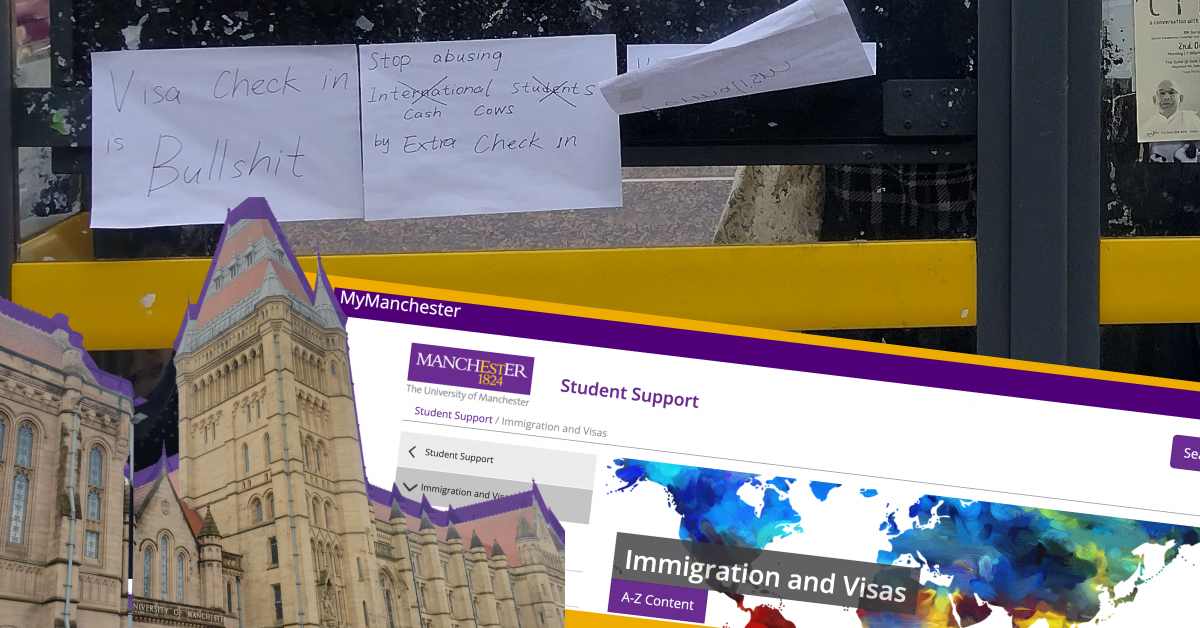Spot checks on international students attendance set to be introduced

The interviewees in this article have been anonymised with fake names.
Spot checks on international students during in-person taught sessions are set to be introduced later this academic year, The Mancunion can exclusively reveal.
This was discovered as part of an investigation into the recent introduction of in-person attendance checks for international students, which are set to continue for the remainder of the academic year.
As of November 6, the University of Manchester has spent £13,783 running the nine separate check-in locations since they began operating this September. The University has also employed 14 new members of staff in order to run these sites. This information was obtained by The Mancunion through a Freedom of Information request.
When The Mancunion asked the University when they expect the current attendance check-in system to revert to the system used in the previous academic year (2022/23), they responded with the following:
“We will not be reverting to the process used in 2022/23 and will be moving to a new more holistic engagement monitoring system. As this has a systems dependency, the procurement schedule has been delayed by a Cyber incident experienced by the University, but is now back underway. At this stage it is not possible to confirm a date when this will be in place but we are working to ensure this will be as soon as possible.”
At time of publication, the University has not expanded on what a “holistic engagement monitoring system” will look like.
The international students we spoke to spoke of their dismay towards the new check-in system. Karl told us how his “visa status could be in danger just because of these checks, but in reality, I’m studying and I’m doing what I’m supposed to do.” Karl is a third year undergraduate international student, he told us that the checks make him “feel like I’m not welcome to study here.” He expanded on this, explaining the checks “are a waste of time and very intrusive with my studies.”
When asked how he believed this situation could best be solved, Karl responded that the University should “make the treatment equal for all students and fix MyManchester as soon as possible.”
Adam was also frustrated with the checks, describing them as a “hassle”, adding that “it makes us feel a little bit different.” Adam went on to say that he feels the need to take “extra precaution” with the checks, sometimes going as far as taking a picture of himself in the lecture as evidence that he was definitely there. When talking about the University’s handling of the checks, Adam said that “[the University] could make changes a little bit faster.”
Sasha told us that she believed the checks were “very tedious” and “a little ridiculous”. She added that she feels “paranoid” about her attendance and that she “always” worries about having her visa removed. “It feels like they are treating us different from students that don’t have to check in.” Tim agreed, saying that the checks “make me feel quite unwanted” and that they “feel very unnecessary.”
Unis Resist Boarder Controls (URBC) echoed the concerns of international students. According their website “URBC is a national campaign made up of British, EU, non-EU, migrant students, lecturers, & university workers opposed to Home Office surveillance, the Hostile Environment, and border controls on UK campuses.”
We spoke to URBC to understand the history behind the monitoring of international students’ attendance and what the organisation is doing in response to the changes that have taken place.
They informed us that the monitoring policies currently in place were established in 2008 through the introduction of a “points-based” system for study visas (now Tier 4 visas). This ensured “that universities, in order to be able to sponsor both migrant staff and also migrant students, had to open up their institutions to pre-arranged visits from the Home Office.” They went on to say that monitoring has become “a lot more explicit. Staff and students, home students, can’t avert their eyes from it. We are disturbed by it.”
URBC also spoke about how “attendance monitoring policies are being either escalated or streamlined into digital formats.” This was done in order to make the process more universal “so that it didn’t seem that they were only monitoring the enrolment of migrant staff and students”, obscuring “the targeting of migrant students specifically.”
Universities nationwide adopted a more digital and universal attendance monitoring system in response to challenges faced by London Metropolitan University in monitoring attendance. In 2012, the University lost its licence to host international students due to a lack of international students attendance records. This meant that 2,700 students had to find another university to attend or leave the country.
URBC explained how this incident could have played a key role in what some have called The University of Manchester’s “overcompliance” with government legislation regarding attendance monitoring. It’s believed that this “overcompliance” stems from concerns that a lack of attendance records could result in a violation of Home Office legislation, causing the University too, to lose their licence.
URBC told us that they believe this concern has been exacerbated in recent years due to the financial gain universities receive from international students. They told us that “universities are tied to the funding that migrant students bring into UK higher education” and that “tuition fees paid by migrant students subsidises fees paid by home students.”
An anonymous source at the Manchester Branch of the Universities and College Union (UMUCU), echoed this view, saying that “That’s the threat that hangs over the whole system, that if they don’t comply with these strict visa monitoring measures, they could conceivably lose their licence to sponsor international students.”
They went on to tell The Mancunion how the establishment of in-person checks this year have “made public what was happening all along.” The UCU member told us that even when all students (home and international) were required to register their attendance on MyManchester, only international students contacted her about missed check-ins because these students “understood that the stakes were higher for them.”
Our source also repeated URBC’s belief about the University’s over compliance saying that “whilst Home Office requirements are always changing, most other universities don’t require so many in-person and online check-ins. So it does seem that UoM has gone above and beyond what’s required by the Home Office.”
Attendance checks, in their current form, are set to continue for the remainder of the academic year. The UCU member said that “as long as the Home Office requires [attendance checks], and as long as the University is complicit with that, it is not going to go away. Next year, the system might look different, and it might not entail in-person check-ins. But there will still be attendance checks.”
They also told us about her experience of dealing with these checks as a member of staff at the University. They said that the checks are “very visible” and “very conspicuous.” For international students, “it shapes their overarching experience of university, in a way that a lot of home students aren’t even aware of.”
Commenting on the feelings of UCU members towards the check-ins, the UCU member explained that “staff are angry and frustrated but they don’t know where to channel that because we were not told about this until the semester started when it had already been implemented.”
The UCU has taken action against these checks. So far, the Manchester branch has passed a motion to object to the attendance monitoring and control of students who hold Tier 4 (student route) visas. This motion passed, with 95% of members supporting it. There is also a UCU Equalities Conference in Manchester later this year, which will discuss the ongoing attendance monitoring at universities. Early plans are also in place “to have discussions and training sessions on the background of attendance monitoring and how we [the UCU] might respond.”
UBRC have similar plans of action. For them, “it’s about educating people about these issues to hopefully make them a lot more aware.” They also emphasised despite the changes in past months, it is important not to see it “as a recent issue or a recent policy change, but part of a long trajectory of border monitoring on campus.”
A Freedom of Information request was sent to the Home Office for data on how many students have had their visas rescinded due to a lack of attendance at university. The Home Office responded saying they do not capture data at this level of detail in a readily reportable format, so were unable to respond to our request.
In response to this article a University of Manchester spokesperson said:
“Ensuring compliance with UK visa regulations is essential for us to continue welcoming international students. Our check-in process (detailed at www.manchester.ac.uk/visacheckin) verifies students’ physical presence on campus and their participation in classes. This follows UK government guidelines.
“The current process is temporary, as our online attendance system is unavailable due to a malicious cyber incident earlier this year. We expect to launch a new solution in September 2024 that will monitor the engagement of all students – from that point the separate visa check-in system will no longer be needed.
“We are closely monitoring the temporary processes, to ensure they continue to work smoothly and students can register their attendance as easily as possible.”
The Students’ Union was also contacted for comment. Raluca-Elena Valcescu, Faculty of Biology, Medicine & Health Officer told us the following:
We are actively addressing these issues raised in this investigation. We’ve conducted our own survey to better understand student experiences. We are in close contact with University colleagues to improve the overall experience for all students impacted by these measures.
We want to ensure all students that we are committed to working collaboratively, both with students and the University, to streamline processes and create a more supportive environment for international students.
For students affected by these check-ins, they can contact or visit the SU advice centre.
If you would like to know more about the new check-in system, please visit the Immigration and Visas section of the University’s website.







